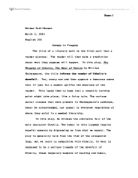“He,
Whose image thou art, him thou shalt enjoy
Inseparablie thine, to him shalt beare
Multitudes like thy self, and thence be call’d
Mother of human Race.” Paradise Lost, p.91 4. 471-6
Consequently, Eve’s mind begins to develop its own ideas on how it might be so that things were actually the opposite of what God had been explaining to her from the beginning. The verse “Multitudes like thy self” annotates that the whole world will be equivalent to her, not Adam, but her. It is she that holds the key to existence, in her lies the power of our future and where it will lead. Because of the way God made “thyself” the key word she begins to gain a sense of certainty and self-assurance. In which part, some is true; however we later come to see that she will be the mother of all human race, but from Adam she descents.
Eve perspective begins to change to the reader’s eyes. In such patriarchal ways, we begin to look at Eve as a strong confident woman. She persuades Adam to break up the chores so that they finish quicker. She believes in herself, enough that she feels that she can retrain from temptation. Despite the submissive behavior Eve seems to ensue when she expresses herself about Adam, this could very well be as cause of the way she feels for him. She never really speaks of any sort of attraction for Adam, however since she was programmed, for argument’s sake, to be less bold. Eve is intended to be modest and always ready to follow Adam, adamantly listening without daring to argue anything said. Could the words she uses to think fond of him be that it is her way of describing her attraction to him? We know Adam confided in Raphael of his undeniable attraction for Eve, yet such feelings are unknown of Eve, though it maybe possible.
Adam’s views are also a pivotal portrayal of Eve. This next passage illustrates Eve as an independent godly being.
“Wisdom in discourse with her
Loses discount’nanced and like folly shows.
Authority and Reason on her wait
As one intended first, not after made
Occasionally. And to consummate all,
Greatmess of mind and nobleness their seat
Build in her loveliest and create an awe
About her as a guard angelic placed.” (Paradise Lost, 8. 552-9)
In some ways this view of a woman were not at all considered at the time this poem was written. The fact that Eve was domesticated to fit the needs of Adam, he nonetheless, thought of her as powerful, wise, and gracious. Although he knew her inferiority to him, he did not however make her subjective to him. He allowed her to be herself only imposing when he felt necessary.
Against the times that have a completely differently standpoint on women, subordination was somewhat implied but not in a cruel way. Eve was subordinate to Adam, but was also able to think and act freely on those thoughts, even if it were a sin. There was no written doctrine that she must do exactly what he said. Later on in the poem we learn that she now decides to listen and do what Adam says, however that decision came about by choice and understanding that she was at fault that they were exiled from paradise. In difference with the times, Eve was very well in full control of her future and seek repentance for her sins.
Works Cited
Milton, John. Paradise Lost. Norton Critical Edition
NY: Norton & Company, 2005
Lewalski, Barbara, K. from “Higher Argumen”: Completing and Publishing Paradise
Lost. (p466-476) NY: Norton & Company, 2005







